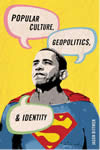Introducing Jason Dittmer
 Jason Dittmer (1976, Jacksonville) is Lecturer in Human Geography at UCL. He obtained a BA in Political Science and International Studies from Jacksonville University in 1998 and an MA in International Affairs from Florida State University in 1999. Dr Dittmer got his PhD in Geography at Florida State University in 2003.
Jason Dittmer (1976, Jacksonville) is Lecturer in Human Geography at UCL. He obtained a BA in Political Science and International Studies from Jacksonville University in 1998 and an MA in International Affairs from Florida State University in 1999. Dr Dittmer got his PhD in Geography at Florida State University in 2003.
This interview is based on his new book “Popular Culture, Geopolitics, and Identity”. Dr Dittmer gives his views on popular geopolitics and related concepts such as representations, postcolonialism and social constructivism. He further elaborates on the meanings of affect, the location of James Bond movies and popular culture.
Interview
The book
What made you decide to write a book that combines popular culture, geopolitics and identity?
I thought that the field of popular geopolitics had gone through such a rapid expansion in the past decade or so that someone needed to try and consolidate it in some way; to systematize it a bit. Most people who write on the topic do so as an aside from what they are usually researching, because a movie piqued their interest or something like that. Consequently, I don’t think anyone had really tried to put it all together. And of course I think popular culture is a great way to get students to think about geopolitics – it has a little extra sizzle that other approaches can sometimes lack.
Why did you base your book largely on the social constructivist perspective?
Well, I suppose it’s because I think that’s the perspective most of the literature adopts. The focus on discourse in critical geopolitics has been pretty relentless (some would argue too much so). While I certainly wanted to book to reflect my views, I wanted it to do justice to the body of work that it was drawing on, so the book mostly adopts a social constructionist perspective. Further, I think it provides a nice link between the world of media we are immersed in and our own understanding of ourselves – I think social constructionism is very good at explaining how media shape our self-images and vice-versa.
Popular geopolitics and related concepts
Why do you argue that ‘we are all “doing” popular geopolitics all the time’?
To me that’s the argument that is central to the project of popular geopolitics. Usually geopolitics gets framed as ‘big boy’ research, dealing with wars, diplomacy, and the like. The importance of popular geopolitics is, I think, in pointing out that all those ‘big boy’ events are reliant on the billions of everyday interactions between people and media, and then how people engage with each other in ways contextualized by those media.
One piece of jargon that I think is really helpful is the notion of ‘performative consumption’. Performative consumption describes the double-ness of engaging with popular media – not only are you consuming, for instance, a war movie and constructing meaning from the dialogue and images, but you are also performing an identity when you do so. For instance, you could be watching the movie with a sense of gung ho excitement, or you could be watching it ironically, laughing at the one-liners that are meant to be inspirational. Thus, engaging popular media is not just passive, as many critics of TV or pop music would have it – it’s also active in that you shape the ways in which you are oriented to that popular medium.
To what extent can we speak of an ‘Americanisation of popular culture around the world’?
I’m actually quite sceptical about the Americanisation thesis. Certainly American popular culture circulates around the world, probably more than most. As an American living in London I am mostly able to keep up with my favourite shows from the States. Amusingly though, my mother in Florida is always telling me about the best BBC shows that I should be looking out for. So I think using the term ‘Americanisation’ obscures more than it illuminates.
Also, I think the focus on where media come from ignores the question of where it goes, and what happens to it when it gets there. There’s a lot of interesting work in cultural studies that looks at the globalisation of popular media, and how these media are interpreted differently in different locations. Again, consumption isn’t just passive acceptance of media content, but is itself active in the production of the meaning of that content. So ‘American’ popular culture is itself re-worked by the experience of being globally mediated.
What is the postcolonial perspective and how does it relate to critical geopolitics?
Postcolonialism is the intellectual movement attempting to de-centralize global knowledge production. Despite the formal end of most empires several decades ago, we still live in a world where knowledge is produced in certain places, often about other places. So there’s a crisis of representation – who gets to describe someone else, and under what circumstances? Certainly geopolitics has been one of the worst culprits here, historically speaking, and the emergence of critical geopolitics in the late 1980s and early 1990s can, I think, be seen very much as an attempt to create a postcolonial geopolitics. However, I’m not sure we’ve been entirely successful – critical geopolitics still seems to be largely a metropolitan project.
What is affect and how can it be useful in geopolitical research?
Affect is a term that describes the physical, embodied experience of social life, unmediated by language. It’s definitely not an easy concept to get your head around at first, and it’s certainly not an easy concept to utilize in geopolitical research. But I think the fact that it’s hard to use in our current research paradigms is an indicator of how narrow our understanding of ‘the social’ currently is. Proponents of affect describe it as the ‘excess’ – what’s left over after we engage with a topic in terms of discourse and representation. And I hate the idea of that excess going to waste. Some people, like Sean Carter and Derek McCormack, are doing great work thinking through the relationship between affect, movies, and geopolitics. I think though that those of us working in critical geopolitics still have a long way to go in thinking this through. If we think of popular geopolitics as the geopolitics of everyday life, and yet we aren’t trying to account for these everyday interactions between bodies and environments, then I think we’re being wilfully ignorant. It doesn’t have to be the centrepiece of popular geopolitics, but I think it ought to be a part of the picture.
Representations
What are representations and why do they matter in popular geopolitics?
Representations are mediated versions of places and spaces; they’re central not just to popular geopolitics but to geography in general. Imagine a visit to New York or Paris; part of your experience of being there is the unreality of seeing the actual place that you’ve seen thousands of times before in movies or television. Our understandings of the world in fact rarely come from first-hand experience, but from books, news media, friends’ travel stories, and the like. I think the important insight about representation that comes out of geography, and popular geopolitics in general, is that it’s not a question of biased images, or accurate representations – a place like New York or Paris (or Topeka, or Hull) can’t be distilled into a single representation. Rather, places and spaces are produced through the myriad of images available in movies, books, friends’ travel stories, and the like. Therefore, via the logic of performative consumption described earlier, we all play a role in producing these places, and we’re all being geopolitical when we do so because how we imagine a place like Kabul obviously has huge ramifications.
What role do representations play in James Bond movies?
Klaus Dodds has done some fantastic work on the James Bond movies which were quite inspirational to me when I was just getting started. He makes the point that the role of place in the James Bond movies is central to setting up the tension. The places in which Bond swings into action are usually not the major powers themselves, but instead they are countries at the margins of the geopolitical order, in which the major powers battle for the fate of the world. Bond moves in and out of these countries with impunity, and the local governments never factor into the situation at all. Of course, the whole premise of James Bond is that the UK is a major player in preventing the overturning of the world order, with the Americans a clumsy, muscular, sidekick to the debonair and suave British Intelligence. In short, James Bond provides a fascinating lens through which to view popular geopolitics.
What could be the impact of the representations in ‘first-person shooter’ video games?
I’m sceptical of any discussion of the ‘impact’ of representations because of my belief in the active nature of consumption, which I mentioned earlier. But certainly representations matter in that they provide cultural resources from which people can produce their geopolitical imaginations. Currently, Ian Shaw is doing some great work looking at the popular geopolitics of first-person shooters and he emphasizes the Orientalist nature of the recent crop of first-person shooters. I think this can be connected to a whole array of literature that has emerged over the past few years in the work of people like Derek Gregory on the cultures of targeting, bombing, and killing. When you play a video game where every character is either a soldier on your team or a terrorist avatar trying to kill you, it’s easy to forget that in real life these urban spaces are filled with non-combatants, whether women, children, or men. Finally though, I think first-person shooters are a perfect example of affect – when I play these games it’s the adrenaline-pumping, itchy trigger-finger immersion in the video game experience that I remember most, not what the enemies look like. I think we need to find ways of researching that phenomenon more completely.
To what extent can new media contest hegemonic representations?
I think there’s a lot of potential there, and we see it all the time. The recent videos of the Israeli Gaza flotilla are another reminder that the ability of governments to construct official and approved understandings of events is continually undermined by YouTube and its cousins. Similarly, the release of the video of the US military gunning down Reuters reporters by Wikileaks forced a new discussion about US policy. These are the ‘big’, obvious, influences of the new media.
But I think the more important shifts are in the fragmentation of discourses that blogs enable. Some of my research has looked at conspiracy theories and it’s fascinating to see how hyperlinked information enables the construction and presentation of entirely new subaltern knowledges. In general I think it’s a good change and might even help to distribute power more evenly throughout society, but I’m sure we’ll have some political challenges in the future that will make us think twice about these developments. For instance, the ‘Birther’ movement in the US drew on the internet a great deal for the circulation of its ideas. You take the good, you take the bad, I suppose.

